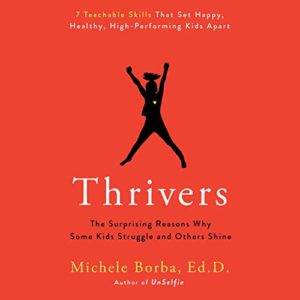 Michele Borba begins this book by making a very important distinction: we have sought to raise children who strive, but while strivers can reach for more, they are left feeling empty and with dwindling psychological reserves when their goals are not met. A necessary ingredient is a deep inner strength and grounded identity where one explores who they are rather than simply trying to prove their worth with extrinsic grades and accomplishments. We need a generation of thrivers with strong cores and character strengths that will enable them to move forward with purpose as they build their identities and maximize their potential. In her book, Thrivers: The Surprising Reasons Why Some Kids Struggle and Others Shine, she prepares us to teach our children and create the best environment for kids to develop the seven core character strengths that lead to flourishing: increasing their self-confidence, empathy, integrity, self-control, curiosity, perseverance, and optimism. But we do this, not by imposing our beliefs, but by listening to our children and helping them discover who they are becoming.
Michele Borba begins this book by making a very important distinction: we have sought to raise children who strive, but while strivers can reach for more, they are left feeling empty and with dwindling psychological reserves when their goals are not met. A necessary ingredient is a deep inner strength and grounded identity where one explores who they are rather than simply trying to prove their worth with extrinsic grades and accomplishments. We need a generation of thrivers with strong cores and character strengths that will enable them to move forward with purpose as they build their identities and maximize their potential. In her book, Thrivers: The Surprising Reasons Why Some Kids Struggle and Others Shine, she prepares us to teach our children and create the best environment for kids to develop the seven core character strengths that lead to flourishing: increasing their self-confidence, empathy, integrity, self-control, curiosity, perseverance, and optimism. But we do this, not by imposing our beliefs, but by listening to our children and helping them discover who they are becoming.
One appreciates the important distinctions Borba makes as she compares not only strivers and thrivers but also draws important distinctions between self-esteem and confidence. This important attention to the words we use is one of the author’s fundamental strengths. The book teaches the reader not only what to do but clarifies a vocabulary that frames the discussion. But these distinctions are not platitudes, she backs them up with research even to the point of discussing research that shows the benefit of asking children for “helpers” as opposed to asking for “help.” When do we ask ‘why?’ When do we ask ‘who?’ Throughout the text, we are shown the benefit of these subtle changes that we can make that can mean a lot for identity development.
The research-driven focus of this book is grounded in the voices of young people and how they are making sense of the culture they are growing up in. We hear how children are interpreting the intentions of adults and how they view their personal strengths and aspirations. You will quickly find that these authentic voices echo the youth in your life, but here Borba helps us to situate these ideas into themes that allow us to deeply attend to what our kids are saying leading us to ways we can better support them. Importantly these pages also alert the reader to the questions we are not asking our kids. This rich dialogic structure makes the book a fun read as you see the frank, often funny, and always insightful ways kids explain their world. It is these voices that bolster the concrete recommendations that permeate the pages.
From the first chapter, you can navigate the book as you see fit guided by the early surveys to assess character strengths. The surveys and activities make for an interactive and reflective read while stirring your creativity as you develop the long-term project of trying to support a child’s development. While some of these activities are simple boards or charts to help children build these essential skills, much of the book is dedicated to helping you change your conversations. Borba takes simple regular activities and life events and suggests how we can converse with kids to grow their character strengths and explore identity and motivation.
While this book gives recommendations geared toward toddlers to young adults, I would also argue that it is loaded to the brim with concrete advice for self-improvement for the adult reader. Yes, of course, it can help one be a better mentor, but it also helps the reader to turn the activities on themselves. Who among us does not believe our self-confidence, empathy, integrity, self-control, curiosity, perseverance, and optimism can use some tweaking as we search for our own actualized selves? Many of the life hacks you will find in this book will apply to you as well. What is your own inner language you use to coach yourself? What are some of the character strengths you would like to improve? And how can you do some simple activities to explore yourself and help ground your own identity? If you are reading this book to be a better mentor, teacher, or parent, this book can take you along in their journey not as a guide, but also as a partner.



